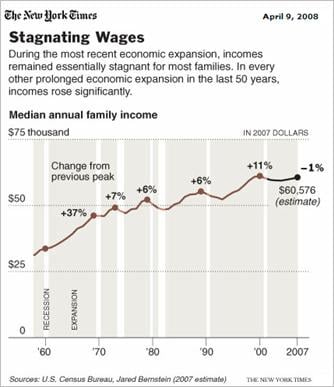The Bush League Economy in a Picture
Once in a rare while, a single image tells you everything to know about the American economy. On Wednesday, the New York Times featured a simple chart showing that President Bush has presided over the first post-World War II economic expansion in which Americans' median family income declined. If the American Dream is defined in part as each generation doing better than the one before, then the Bush League Economy can officially be declared a nightmare.
David Leonhardt's devastating piece ("For Many, a Boom That Wasn't") reveals what most Americans already or at least suspected: Americans' standards of living have declined during President Bush's tenure:
In 2000, at the end of the previous economic expansion, the median American family made about $61,000, according to the Census Bureau's inflation-adjusted numbers. In 2007, in what looks to have been the final year of the most recent expansion, the median family, amazingly, seems to have made less - about $60,500.
This has never happened before, at least not for as long as the government has been keeping records.
But as I first suggested back in December 2005, the disturbing stagnation of Americans' wages and salaries is only facet of the abysmal Bush league economy. Even as 47 million Americans now lack health care coverage, costs have continued to soar at double the rate of wage growth even as the percentage of employers providing insurance has plummeted below 60%. Meanwhile, energy costs continue to soar, with oil topping $100 a barrel as the price of gasoline hits new records. By 2005, Americans' personal debt reached $2.2 trillion, an explosion from the $1 trillion just a decade earlier. And making matters worse, the American people now face twin credit crises savaging the housing market and the U.S. financial system.
Just in case there was any lingering doubt, Americans' economic insecurity and income inequality not seen since the 1920's make the perpetuation of the Bush tax cuts political unacceptable and morally repugnant. Having already broken his 2004 promise to halve the federal budget deficit by 2009, President Bush wants those cuts made permanent. Those Bush tax cuts aren’t merely responsible for over the half of the reemerging deficits, but have flowed overwhelmingly to the wealthiest Americans who need them least. John McCain, who in the pursuit of the Republican presidential nomination decided to reverse course and back making the Bush tax cuts permanent, had it right back in June 2001:
"I cannot in good conscience support a tax cut in which so many of the benefits go to the most fortunate among us at the expense of middle-class Americans who need tax relief."
That was the right position in 2001 and it's the right position now. Unfortunately, even the American Dream becomes a fading memory for more people each year, the Republican Party and its amen corner continue their drum beat for endless tax relief for the only Americans who benefited during the years of the Bush League Economy. As for President Bush, he already has his plans in place as he exits the stage. "I'll give some speeches," he said, "just to replenish the ol' coffers."



This is sad indeed. Bush is trying to start another war in september 2008 with iran, according to npr http://www.wamu.org/audio/dr/08/06/r2080606-21108.asx
I guess the empire is in a self destruct mode.Americans elected bush twice, despite all the lies he told. Now one wonders whether they believed his lies, or what, but we are paying the price for poor leadership.Mccain will win in november if he is healthy, the pattern repeats itself.